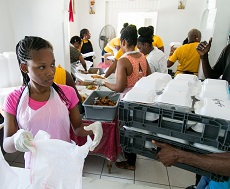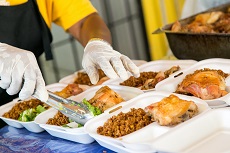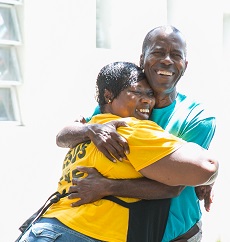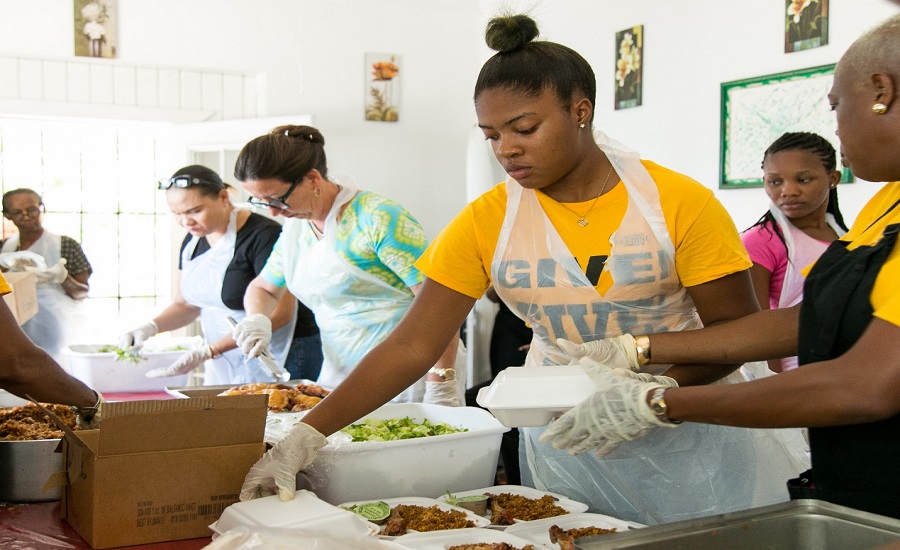
Bahamas Photographer
#Bahamas, August 24, 2017 – Nassau – In a world of fast-paced, high tech talk and expectations, a ritual plays out every week in a modest house in an even more modest neighbourhood that reminds us of what humanity is all about.
The building where it takes place is called Mosseff House. Donated by the Davis family who never forgot their humble beginnings in the Fox Hill community, the little yellow structure next to the Fox Hill Police Station comes alive every Thursday and Sunday preparing food for the hungry.
Volunteers clean, chop, marinate and cook over 500 pounds of chicken a week. They grate cabbage for coleslaw, stir massive pots of peas ‘n rice, wash and tear enough lettuce to lay out a regulation football field.
And every movement, every stirring with a supersized spoon or plating and packaging in individual containers is accompanied by a smile and inspired by compassion.
“Hunger is a horrible thing to endure, but together we can wipe it out,” says Philip Smith, who has been feeding the hungry for more than a decade, these days as executive director of the Bahamas Feeding Network. “What we see out there breaks your heart. Some of the people in the community who come to collect their meal may not eat another hot meal until the next time they come to the door which could be three or four days away. We are a rich nation and yet there are people hunting for scraps in dumpsters.”
Founded in 2013, the Bahamas Feeding Network is the brainchild of its patron His Excellency Frank Crothers, Ambassador of the Order of Rhodes & Malta. Since its launch, the Network has provided hundreds of thousands of dollars in food coupons and supplies to help ease the pain of hunger. It has donated food or cooked meals for over 120 soup kitchens, churches with feeding programs, children’s homes and senior centres throughout The Bahamas. Its vans crisscross the island meeting up with church or feeding centre representatives or feeding centres, its packages are routinely shipped to Family Islands.

Bahamas Photographer
The Feeding Network’s board of directors reads like a Who’s Who of The Bahamas – Felix Stubbs, Chairman, Bamboo Shack and Sapodilla entrepreneur Elaine Pinder, financial services executives Shayne Davis and Patricia Hermanns, Osprey Development and Gunite Pools chairman Peter Whitehead, tireless community service worker Robin Symonette, McKinney, Bancroft & Hughes Partner Sean Moree, Pastor Timothy Stewart.
Nearly every major food retailer or wholesaler has gifted food or sold it at reduced prices for the cause.
Their donations are essential, says Smith. “We could not do it without our sponsors.”
But all the supplies, the 40-lb bags of chickens, the 50-lb sacks of rice, the hundredfold high stacks of Styrofoam containers would be inanimate promises of hope without the hands and hearts of volunteers like Skully and Solomon.
“Their dedication is unbelievable,” says Crothers. “I don’t know how they do what they do and do it with such love.”

Bahamas Photographer
Skully, short for Recina Ferguson, hauls hundreds of pounds of chicken. It may be 1 am Saturday morning when she unlocks the door at Mosseff House to begin prepping for Sunday. While others are sound asleep, she is cleaning, chopping, seasoning. A retired teacher and tutor, she’s been known to work 18 hours straight. And never a penny’s pay. “This is my heart,” she says. On Sunday, her male counterpart, Solomon, a tall, wiry and fit man, hoists a huge steaming tub of peas ‘n rice, running with the burning hot pan to replace the one that volunteers like Wendy Deveaux have just finished dishing out.
With as many as 30 volunteers, often buoyed by organisations like Rotary, Kiwanis and Rotaract that swell the numbers even higher, the cooking and preparation of containers can take as little as five hours or as much as nine. Last Sunday, people from the Fox Hill community collected 300 meals before the distribution with vans even began or church and feeding centre representatives showed up to collect the distribution trays.
“These meals are going to help people who largely fall below the poverty level which the government pegs at $11.74 a day. And the government’s own statistics show that one in every 7-8 people falls into that category. When we cook, plate, package and donate meals to the hungry, everything is carefully accounted for but what we can never measure is the love that goes into each one,” says Smith. “You have to be there, to hear the singing, watch the camaraderie and feel the spirit. Then you will understand.”
A small house with a very large mission.
Press Release: DPA News
Photo Credit: DPA


 TCI News1 week ago
TCI News1 week ago
 News6 days ago
News6 days ago
 Bahamas News4 days ago
Bahamas News4 days ago
 News6 days ago
News6 days ago
 Bahamas News3 days ago
Bahamas News3 days ago
 Caribbean News7 days ago
Caribbean News7 days ago
 Health3 days ago
Health3 days ago
 News1 week ago
News1 week ago














